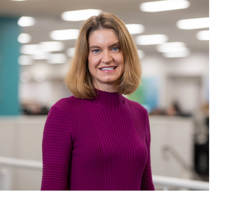Over the years, the number of Chief Sustainability Officer (CSO) appointments has significantly increased, extending across a wide range of industries. Now, Chief People Officers (CPO) taking on their organisation’s sustainability agenda is on an upward trend.
As part of our ‘Sustainability Matters’ series, Jo Mortimer, Consultant in Odgers Berndtson’s People & Culture Practice, spoke with Paula Coughlan, Chief People, Communications and Sustainability Officer, Currys plc, about her transition into leading the sustainability agenda at Currys.
How have you become involved with the sustainability agenda?
I joined Currys as Chief People Officer in 2019 and then adopted the roles of Chief Sustainability Officer and Chief Communications Officer in 2022. There is an intersection between the people agenda and the sustainability agenda in relation to our purpose: to help everyone enjoy amazing technology. We have found our sustainability agenda is a big driver of colleague engagement, giving our people pride in delivering our purpose responsibly. Prioritising sustainability also helps with attracting talent.
Who are the key stakeholders in agreeing targets and why is it so important to have them onboard to achieve deliverables?
Our group sustainability leadership team is made up of people from across the business in different functions. The agenda affects all parts of the business and includes representatives from commercial to operations. This group is our primary method of delivering on promises, and our work feeds up to the Board ESG committee, which I also sit on.
The ESG committee remit encompasses our three sustainability strategic priorities, and also elements of the people plan, including diversity, equity and inclusion and the colleague listening strategy.
How has the sustainability agenda evolved during your tenure at Currys?
Taking an approach of ‘what can we do that others can’t do?’, we set and agreed three priorities:
- Build a circular business - This is a real priority for us and encompasses giving tech a longer life through the repair, reuse, protection and harvesting of parts. We have huge capabilities in this area, completing 1.3 million repairs a year and handling 100,000 tonnes of recycling. Our facility in Newark, Nottinghamshire, has around 1,000 repair technicians. We also offer customers a ‘Care and Repair’ programme, where we fix or replace covered products. Our ‘Cash for Trash’ initiative helped us collect 1.6m items of obsolete tech hardware last year in the UK & Ireland. We are also looking to evolve our trade-in capability whereby customers can trade-in and upgrade their tech products every three years.
- Net Zero - Since 2020, we’ve reduced our emissions by 43% and achieved eighth place in the Financial Times Climate Leaders Index. We have committed to an investment roadmap, ensuring we can sustain our efforts to minimise our environmental impact.
- Alleviate digital poverty - Access to technology is no longer a ‘nice to have’ but essential for education, health and essential products. We co-founded the Digital Poverty Alliance, a charity with the aim of achieving digital inclusion. We donated £1 million initially and have raised almost another £0.5 million through customers for our Tech4Families programme. So far, the charity has supported over 1,000 UK families with access to devices.
How has Currys’ sustainability agenda been particularly successful since its introduction?
One of the things I’m most proud of is the recognition within the organisation for what we are achieving. In our last colleague survey, 80% were aware of the steps we are taking to minimise our environmental impact. It’s the passionate engagement of people - all of whom have day jobs - that keeps the agenda alive.
What else do you feel has been rewarding?
Launching the national delivery plan with the Digital Poverty Alliance at the House of Lords has been another real highlight, as has watching the foundation grow and gain traction across government, third sector and commercial partners to affect change.
What are the key challenges for HR executives taking on a sustainability agenda?
You must have a steadfast commitment to effecting positive change. The challenge is you are seeking investment and not for a financial return in the traditional sense; particularly in the current economic climate, that is not easy. You need to consistently help people understand the ‘why’ through effective campaigning and influencing.
What advice would you offer?
I would recommend setting out a web of people to make things happen and clarify peoples' roles and responsibilities in shaping and delivering the plan. You have to build a collective sense of purpose, agree on an agenda and have individual accountability.
Balance is also vital. The agenda needs to be championed and advocated while also being a pragmatic commercial business leader. It’s doing right for the business while also doing right in a broader sense. Purpose and profit go hand in hand.
Finally, I can’t over-emphasise the amount of detail needed. As sustainability is highly governed and scrutinised, there is extensive gathering of data needed for reporting. This is for good reason - so investors can understand and scrutinise business performance against these targets. This will only become more prominent as ESG legislation advances. You find yourself being an inspired visionary and strategic change agent one minute and looking for that energy invoice the next. The detail must be spot on.
Odgers Berndtson identifies top-tier leaders who can meet the challenge of establishing and implementing successful sustainability and ESG agendas. We advise organisations across the globe on their sustainability journey, no matter the starting point. Our own carbon emissions reduction targets have been approved by the Science Based Targets Initiative (SBTi), an independent organisation which evaluates and provides accreditation to companies’ carbon targets.

Paula Coughlan is Currys' Chief People, Communications and Sustainability Officer, a role she has held since 2019, when she joined with the ambition to build and lead a world-class People Team that could shape and drive the business' cultural transformation. This team now also provides vital counsel to the CEO and the Executive Committee.
Explore more of our Sustainability Matters series.
Get in touch. Follow the links below to discover more, or contact our dedicated leadership experts from your local Odgers Berndtson office here.

Never miss an issue
Subscribe to our global magazine to hear our latest insights, opinions and featured articles.
Follow us
Join us on our social media channels and see how we're addressing today's biggest issues.



